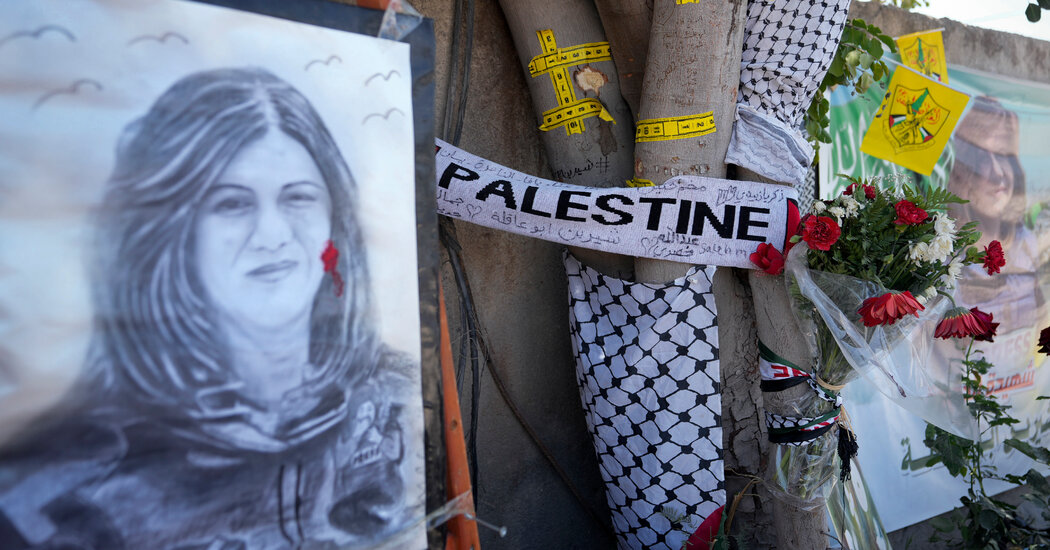
RAMALLAH, West Bank — The Palestinian Authority announced on Thursday its final findings from a two-week investigation into the killing of a veteran Palestinian-American journalist, again accusing Israeli soldiers of intentionally killing her.
The Authority’s attorney general said at a news conference in the West Bank city of Ramallah that an Israeli soldier shot the Al Jazeera journalist, Shireen Abu Akleh, on May 11 with an armor-piercing bullet fired from a Ruger Mini-14 semiautomatic rifle. It based its findings in part on examination of the high-velocity 5.56 mm bullet that struck her in the back of the head.
Palestinian officials said that they were the only ones who had examined the bullet and neither Israeli nor U.S. authorities were permitted to examine it.
“It was proven that a member of the Israeli occupation forces stationed in the middle of the street fired a live bullet that hit the martyr journalist” directly in the head, said the attorney general, Akram Al-Khateeb. She was shot “while she was trying to escape from the successive gunshots fired by the occupation soldiers,” he added.
Israel’s Defense Minister Benny Gantz responded to the Palestinian announcement by saying Israel was still conducting its own investigation into her killing, adding that any claim that the military intentionally harms journalists is a “blatant lie.”
The Palestinian conclusions reiterated those of the Authority’s preliminary investigation, announced two days after Ms. Abu Akleh was killed during an early morning Israeli military raid on the occupied West Bank city of Jenin. She was wearing a blue flak jacket and a helmet marked with the word “Press” when she was shot.
Another Al Jazeera journalist, Ali Samoudi, who was also wearing a protective vest, was shot in the back.
The bullet became the focus of separate efforts by Palestinians and Israelis to investigate the killing because etchings could match it to the gun that fired it. Israel has called for Palestinian officials to share the bullet that killed her so that Israel can see if it matches a rifle used by one of its soldiers on the day of her death.
But the Palestinian Authority, which administers parts of the West Bank, has repeatedly rejected Israeli calls to jointly investigate Ms. Abu Akleh’s killing as well as Israel’s request to examine the bullet.
The Israeli military said in its initial investigation that it was not possible to unequivocally determine the source of the gunfire that killed Ms. Abu Akleh and she could have been killed by an Israeli soldier or a Palestinian gunman.
A spokesman for the Israeli military, Lt. Col. Amnon Shefler, said the army could not comment on whether Israeli soldiers used Ruger rifles during the raid before the conclusion of Israel’s own investigation into the killing.
The results of the Palestinian investigation drew from an autopsy, forensic testing on the bullet and witness accounts as well as tree markings where other bullets struck, according to the attorney general.
Amateur video filmed at the site before and after her killing shows that there was no gunfire in the minutes preceding her killing. Bystanders were chatting and joking with each other in the seconds before she was killed, during a lull in the fighting.
Ms. Abu Akleh was shot from a distance of between 170 to 180 meters away, the Authority’s investigation found. Multiple videos from before she was shot showed a number of Israeli military vehicles stationed up the road.
An experienced reporter for Al Jazeera, Ms. Abu Akleh was an icon to many Palestinians, having reported for years on the Israeli occupation of the West Bank for one of the Middle East’s leading television channels.
Two days after her death, her funeral brought thousands of Palestinians to the streets of Jerusalem. Israeli police officers beat and kicked mourners carrying her coffin, after a disagreement about how the coffin should be carried to the funeral ceremony in a church in the Old City of Jerusalem.
Israel has mounted regular raids in the Jenin area since late March. Israel says the raids are necessary to curb a recent wave of attacks on Israelis, some of whose perpetrators came from the Jenin region. Palestinians consider the raids as a form of collective punishment.
This week, the Palestinian foreign ministry said it had submitted a letter to the International Criminal Court regarding various crimes committed by Israel in the occupied West Bank and particularly the “crime of execution” of Ms. Abu Akleh.
Patrick Kingsley contributed reporting from Jerusalem.




